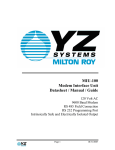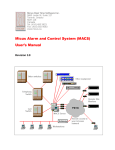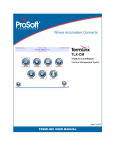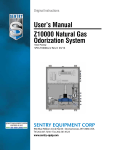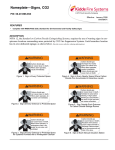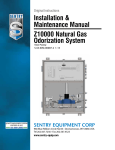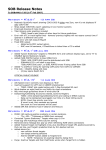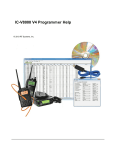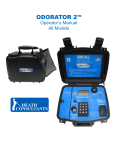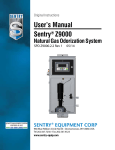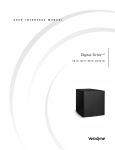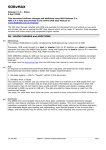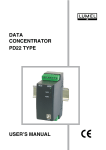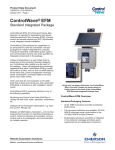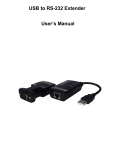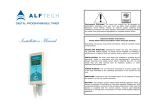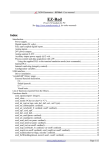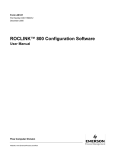Download Sentry4 Manual
Transcript
Sentry4 NJEX Odorant System Software Operators Manual Remote operation Documented audit trail Analyzing and reporting graphs Page 1 10/25/2007 Sentry4 NJEX Odorant System Software Page 2 10/25/2007 Sentry4 NJEX Odorant System Software Information contained in this document is subject to change without notice and does not represent a commitment on the part of YZ Systems, Milton Roy. No part of this manual may be reproduced or transmitted in any form or by any means, electronic or mechanical, including photocopying and recording, for any purpose without the express written permission of YZ Systems, Milton Roy. Index How to Use this Manual ................................................................................................................. 6 Typographic Conventions............................................................................................................... 6 Getting Help.................................................................................................................................... 6 Features ........................................................................................................................................... 7 Features include: ......................................................................................................................... 7 File Structure:.............................................................................................................................. 7 System Requirements...................................................................................................................... 8 Minimum Computer System Requirements: .............................................................................. 8 Recommended Computer System Configuration: ...................................................................... 8 Minimum NJEX Odorization System Hardware Requirements:................................................ 8 Sentry Products Available from YZ Systems: ............................................................................ 8 Using the Mouse ............................................................................................................................. 9 Using the Keyboard ........................................................................................................................ 9 The Audit Trail ............................................................................................................................... 9 System Components Overview....................................................................................................... 9 Sentry4 Software....................................................................................................................... 10 Memory Module ....................................................................................................................... 10 NJEX Controller ....................................................................................................................... 10 Basic System Concepts ................................................................................................................. 11 Operating the Basic Sentry4 Monitoring System ......................................................................... 13 System Registration ...................................................................................................................... 14 Installation..................................................................................................................................... 14 Prepare to install Up Sentry4 On Your Computer:................................................................... 14 Installing the Sentry4 Program: ................................................................................................ 14 After Installing the Sentry4 Program:....................................................................................... 15 Running Sentry4 ........................................................................................................................... 15 Program Window Overview ......................................................................................................... 16 Menu Bar/Toolbar..................................................................................................................... 16 Event Log.................................................................................................................................. 16 Event Marker ............................................................................................................................ 17 System Log Information ........................................................................................................... 17 System Performance Information ............................................................................................. 17 Menu Bar Operations.................................................................................................................... 18 File ............................................................................................................................................ 18 File/Open................................................................................................................................... 18 File/Close .................................................................................................................................. 18 File/Save as… ........................................................................................................................... 18 File/Print ................................................................................................................................... 19 File/Exit..................................................................................................................................... 19 View.......................................................................................................................................... 19 View/Event/Odorization Log.................................................................................................... 19 Page 3 10/25/2007 Sentry4 NJEX Odorant System Software View/Communications Monitor ............................................................................................... 19 View/QuickView Report .......................................................................................................... 19 Setup ......................................................................................................................................... 19 Setup/Parameter Files ............................................................................................................... 20 Setup/Communication............................................................................................................... 21 Setup/System Password ............................................................................................................ 21 Setup/Memory Module Connection.......................................................................................... 21 Module ...................................................................................................................................... 22 Module/Setup............................................................................................................................ 22 Module/Download .................................................................................................................... 22 Module/Clear ............................................................................................................................ 22 Help........................................................................................................................................... 22 Help/Sentry Help ...................................................................................................................... 22 Toolbar Operations ....................................................................................................................... 23 Open .................................................................................................................................. 23 Save ................................................................................................................................... 23 Print ................................................................................................................................... 23 Events ................................................................................................................................ 23 Communications................................................................................................................ 23 QuickView ....................................................................................................................... 23 Delete ................................................................................................................................ 23 Select records .................................................................................................................... 23 Alarm Logs........................................................................................................................ 24 Parameter Log ................................................................................................................... 25 Graph................................................................................................................................. 26 Monitoring......................................................................................................................... 26 Setup ............................................................................................................................................. 27 Overview................................................................................................................................... 27 System Password ...................................................................................................................... 27 Parameters Setup....................................................................................................................... 28 Memory Module Initialization.................................................................................................. 29 Installing Memory Module into Controller............................................................................... 31 Removing the Monitor Module from Controller ...................................................................... 31 Data Retrieval and Management................................................................................................... 32 Downloading the Monitor Module ........................................................................................... 32 Clearing the Monitor Module ................................................................................................... 33 Saving Monitor Module Data ................................................................................................... 34 Graphing Data........................................................................................................................... 34 Page 4 10/25/2007 Sentry4 NJEX Odorant System Software Graphing Data........................................................................................................................... 35 Communications ........................................................................................................................... 38 Overview................................................................................................................................... 38 Sentry4 Serial Connection Basics............................................................................................. 38 Sentry4 Modem Connection Basics.......................................................................................... 38 General Communications Set Up.............................................................................................. 38 General Communications Set Up.............................................................................................. 39 Monitoring Set Up .................................................................................................................... 42 Remote Data Retrieval.................................................................................................................. 46 Automatic Operations (Monitoring) ......................................................................................... 46 Connecting to a Controller........................................................................................................ 50 Download Monitor Module ...................................................................................................... 51 Download Monitor Module ...................................................................................................... 52 Clear Monitor Module .............................................................................................................. 52 Clear Monitor Module .............................................................................................................. 53 Disconnect................................................................................................................................. 53 Switch ....................................................................................................................................... 53 Standby On................................................................................................................................ 54 Standby Off............................................................................................................................... 54 Start Pump................................................................................................................................. 54 Stop Pump................................................................................................................................. 54 Reset Item ................................................................................................................................. 54 Reset Item ................................................................................................................................. 55 Start Verometer Fill Cycle ........................................................................................................ 55 Stop Verometer Fill Cycle: ....................................................................................................... 55 Working with Parameters On-Line............................................................................................... 56 Accessing .................................................................................................................................. 56 Open File................................................................................................................................... 56 Save File.................................................................................................................................... 57 Write Params............................................................................................................................. 57 Refresh ...................................................................................................................................... 57 Use Defaults.............................................................................................................................. 57 Close ......................................................................................................................................... 57 Appendix A – Installing USB-MM adapter and driver ................................................................ 58 Page 5 10/25/2007 Sentry4 NJEX Odorant System Software How to Use this Manual The Sentry4 Manual is a step-by-step guide containing the procedures needed to use a PC to work with the NJEX odorant System. The NJEX odorant System implements the most advanced technology available in the industry. It is recommended that the technicians working with Sentry4 study the manual prior to initiating work on the system for the first time. Typographic Conventions To aide in readability, this manual uses several typographic conventions. Digital versions of the manual, available in Adobe Acrobat™ PDF format, will be highlighted in blue underlined text indicating the copy retains a hyperlink to the referenced item. Getting Help This manual provides solutions to typical questions about the use of Sentry4 software. If the answer can not be found within this manual, contact YZ Systems at: T: 1.281.362.6500 T: 1.800.344.5399 F: 1.281.362.6513 E-mail: [email protected] When calling, have this manual close at hand as a visual aid for customer service. Whether calling or writing, please include the following information: • • The serial number of the NJEX System and the version of this manual. The serial number is located on the inside of the enclosure door. The version (date) of this manual is located at the bottom of each page. A description of the problem and, if applicable the actions of the technical personnel when the problem occurred. Page 6 10/25/2007 Sentry4 NJEX Odorant System Software Features Welcome to the Sentry4 Odorization Program! You've made a wise investment for your company. The NJEX Sentry4 Monitoring System represents a whole new generation of advanced odorization data acquisition, storage, and retrieval. The Sentry4 System is the first and most established paperless audit trail and data capturing system. • Powerful easy to use Windows-based design • Online user manual access • Allows quick configuration of NJEX instruments • Provides powerful tools for analyzing and reporting NJEX data • Export data to formats accepted by most spreadsheet and database programs • Graphing capability allows quick evaluation of odorant level trends Features include: • • • • • • detailed event log gas odorant usage (DOU/HOU) LPG odorant usage (LOU) definable injection rate performance data analysis, documentation and audit trail remote communications capabilities o Online remote control of system functions o Online remote system monitoring File Structure: There are five basic types of files that will be established and used within the Sentry4 System: • • • • • MOD directory: used for temporary data storage of a downloaded monitor module's event log. LOG directory: contains the collective event logs for each Sentry4 odorization system. RPT directory: contains the permanent historical records of each Sentry4 odorization system's LOG file (the audit trail). TXT directory: stores ASCII text files created by Sentry4 from MOD, LOG, or RPT directory files. PRM directory: stores parameter files for repeat use in configuring systems. Page 7 10/25/2007 Sentry4 NJEX Odorant System Software System Requirements The following system requirements must be met or exceeded in order to insure proper operation of the Sentry4 Software: Minimum Computer System Requirements: 486 or higher processor 32MB RAM Memory VGA Monitor (640x480) Windows 95 OS 1 – RS232C Compatible serial communications port (for direct serial connection) 1 – USB port (for USB-MM adapter) 40MB minimum free hard disk space CD Drive Recommended Computer System Configuration: Pentium-Class CPU Mouse or other pointing Device 64MB RAM SVGA Monitor (800x600) Windows XP OS *The parallel port is not supported from Vista. Use a color printer to take full advantage of the graphing and reporting features of the system. Minimum NJEX Odorization System Hardware Requirements: NJEX-6200, 7200, or 8200 series electronic controller package N-200 Controller with code version 2.5 or higher 1 - Sentry Monitor Module model #MM-100 * Some functions illustrated in this manual will not be available in conjunction with data collected from an N-200 controller and memory module. Sentry Products Available from YZ Systems: Part Number F4-1021 F4-0102 F2-0060 Description Sentry4 Software CD (for direct serial connection) Sentry4 Software CD with USB-MM Adapter Download Kit MM-300 Sentry4 monitor module Page 8 10/25/2007 Sentry4 NJEX Odorant System Software Using the Mouse The Sentry4 program is specifically designed for use with a mouse (although a mouse is not required). When operating in the Sentry4 program window, simply select any menu option or function key by "pointing" and "clicking" on the desired item. In some situations, a "popup" window may appear, (i.e., when a pull down menu is used). To use the mouse in any "pop-up" window, choose a desired input field by "pointing" and "clicking" on that field. Then enter the required information with the keyboard and select the appropriate control button to continue. Using the Keyboard The Sentry4 program is most accessible when operated with a mouse; although functions of the Sentry4 program are still available from the keyboard. To access the menu bar press the "Alt" key. Then use the arrow keys to select any desired menu option. When the desired menu option has been highlighted, press the "Enter" key to start that menu item. When using the keyboard in a pop-up window, use the "tab" key to move through the option fields and control buttons. The "shift-tab" key combination can be used to move backwards in a pop-up window. To exit a pop-up window, move to the desired control button (OK, EXIT, etc.) and press the "Enter" key. The Audit Trail The Sentry4 Monitoring System provides a platform for maintaining a complete and accurate gas odorization audit trail. The Monitor supplies the odorization system operator with all the important system performance events such as: system start/stops, odorant usage (Gas-DOU/LOU), or odorant usage (LPG-LOU), system parameters, and system alarms. With this information the operator can track and verify an odorization system's infield performance. The Sentry4 system is like having a full-time technician reporting on every moment of an odorization unit's operation. System Components Overview The Sentry4 system is basically a sophisticated electronic data acquisition tool. The system incorporates three main devices: Sentry4 Software Memory Module NJEX Controller Page 9 10/25/2007 Sentry4 NJEX Odorant System Software Sentry4 Software The Sentry4 program software acts as the hub of some companies' odorization programs. The Sentry4 software supplies the main user interface between each odorization unit and the system operator. The Sentry4 program resides in a PC and supplies the "eyes and ears" of the monitoring system. The software has two methods of downloading information from an odorization unit (via on site monitor module download, or via a remote monitor module download by modem, or RS-485 link) and displays it to the system operator. The operator can then use the software data management features to further evaluate the system's performance. With this information in hand, the operator can make informed decisions regarding the unit's performance. As a result, troubleshooting and maintenance time is kept to a minimum. At the same time, the operator is creating a complete and permanent audit trail of the system's performance. Memory Module The Monitor Module provides the means of transporting information between the odorization system and the Sentry4 software. The module is mounted in the odorization system controller and records up to 120 days of data (90 days recommended). NJEX Controller The NJEX electronic controller houses the electronic control center for the odorization system. The controller administers all system operations and reports the results to the monitor module. All communication and operations between the controller and module are totally transparent to the system operator. The only exception is when the controller checks for a valid module configuration. This test occurs continually and verification of communication is displayed via an indicator block as shown in the illustration at the left. If this indicator is not present no communication between the N-300 and the module is occurring, and therefore the module can not record any data. Page 10 10/25/2007 Sentry4 NJEX Odorant System Software Basic System Concepts The Sentry4 Monitoring System is designed for one primary purpose...to be the most efficient and cost effective manner of bringing proven odorization information from the field to the office. This concept centers around three or four major devices: the NJEX odorization system, the Monitor Module, the Sentry4 software, and an option of a SCADA interface. The main workload of the Sentry4 system is taken care of by the Sentry4 Software and the NJEX odorization system. The Monitor Module serves as a vehicle to transport information between the two other devices. The relationship between these devices is displayed in the following illustration. This illustration shows a simple working diagram of a Sentry4 monitoring system. The system is comprised of these primary systems: • • • Sentry4 System Setup (Monitor Module Initialization) Data Logging and NJEX Odorization System Monitoring Data Retrieval and Data Management o via Sentry4 Software o via MODBUS Page 11 10/25/2007 Sentry4 NJEX Odorant System Software Note that the System Setup and Data Management steps are done in the Sentry4 software. This illustrates the two main purposes of the Sentry4 software. The Data Logging step is controlled in the NJEX Odorization System. The Sentry4 System setup configures the module for recording data in the odorization system. This step initializes a module for use in a specific odorization unit. Afterward, the module is placed in the odorization unit to record system performance. The data logging and system monitoring functions are the only part of the diagram that involves the odorization system. This section involves the raw data collection from the odorization unit. The module is placed into the odorization unit to record the system's performance. After 90 days, or sooner, the module can be retrieved and the odorization data removed. This data will contain all the system performance events needed to evaluate the unit and create an audit trail. The data retrieval aspect of the Sentry4 program removes accumulated data from the module. All the data retrieval and data management functions are contained in this portion of the Sentry4 program. The retrieved records can then be used by the system operator for odorization system evaluation. The operator then will clear the module's memory and returns the cleared module to the unit for more data recording. The data retrieval and data management sections are primarily used for odorization unit troubleshooting and audit trail records. Page 12 10/25/2007 Sentry4 NJEX Odorant System Software Operating the Basic Sentry4 Monitoring System Operating the basic Sentry4 monitoring system is simple. The basics are in understanding the three steps to operating the Sentry4 System. These steps are illustrated in the Basic System Concepts section. The basic system diagram can now be expanded. The new illustration shows a more complete picture of the system's operation. This flow chart display’s all the necessary steps needed to operate a basic Sentry4 monitoring system. Page 13 10/25/2007 Sentry4 NJEX Odorant System Software System Registration This Sentry4 Software is covered by a licensing agreement that governs the use of the software package. Please read the licensing agreement prior to installing and using the Sentry4 Software. By registering your Sentry4 Monitoring System you receive your Sentry4 Program licensing recognition, advanced product releases, service programs, and notification of upgrades. To register, simply complete the accompanying card and return. Installation Prepare to install Up Sentry4 On Your Computer: The following items are needed when the Sentry4 Program operates on a typical PC or Laptop: • A computer terminal that meets the minimum hardware requirements as listed in the System Requirements section • A Sentry4 modem connection, and/or a Sentry4 download cable. • One or more MM-300 (MM-100 optional) Monitor Modules per NJEX odorization system Installing the Sentry4 Program: The following steps should be taken to install the Sentry4 software: 1. Insert the disk labeled Sentry4 software Disk 1 into a CD drive. 2. If “Auto Run” does not start: o Click on Start then select Run from the Start Menu. o Type “D:\Setup.exe” and enter. “D” is the CD drive letter. 3. Click OK. 4. Read the Licensing Agreement and Click OK to continue. o Note: Clicking OK indicates that you agree to the licensing agreement. 5. Follow the on screen instructions to complete the installation. 6. The install program will automatically create the five data sub directories required by the Sentry4 program. These five data sub directories are as follows: • • • • • MOD directory: used for temporary data storage of a downloaded monitor module's event log. LOG directory: contains the collective event logs for each Sentry4 odorization system. RPT directory: contains the permanent historical records of each Sentry4 odorization system's LOG file (the audit trail). TXT directory: stores ASCII text files created by Sentry4 for use by other programs. PRM directory: stores parameter files for repeat use in configuring systems. o Tip: The names of the data subdirectories should not be changed. 7. The Sentry4 software installation is now complete. Refer to the next section, Running Sentry4, to start the Sentry4 program. Then refer to the "Setting up the Sentry4 Program" section to configure the Sentry4 program to your PC. Page 14 10/25/2007 Sentry4 NJEX Odorant System Software After Installing the Sentry4 Program: As a result of the installation process, a Sentry4 shortcut icon was added to the Desktop and a Start menu program list was also created. If needed, the Sentry4 program can be uninstalled using Add/Remove Programs function found in the Control Panel. If an older style parallel port cable is to be used to download memory modules, Sentry4 v1.10 must be used. To enable compatibility with Windows Vista, support for the parallel port was removed after V1.10. Running Sentry4 To start the Sentry4 software you can do one of the following: 1. Double Click on the Sentry4 Icon on the Windows Desktop OR 1. Select the Start Menu 2. From the Start Menu select the Programs menu. 3. From the Programs menu select the Sentry4 icon. These are a couple of examples on how to open the program. The Windows environment also allows other ways to open an application and an operator familiar with Windows can choose however he/she wishes to invoke the application. Below is an example of what the opening screen will look like. Page 15 10/25/2007 Sentry4 NJEX Odorant System Software Program Window Overview The Sentry4 program uses a program window to display an odorization system's event log. A system's complete odorization history and performance can be viewed from this log. The program window contains five basic parts. Each part and its function are described below: Menu Bar/Toolbar Two methods used to interact with and perform various operations with the Sentry4 program. This menu is a typical windows type menu in appearance, and in many functions, but has been specially configured for the Sentry4 software. You may choose menu options from the text menu bar pop up choices, or you may use the tool bar icon type options for specific selected menu options. (See Menu Bar Operations and Toolbar Operations for more details) Event Log The event log displays all the logged events of an odorization system. This window is found in the center portion of the screen. All events pertaining to system operation and/or performance are contained here, (i.e., system parameters, system start/stops, system alarms, odorant usage (Gas-DOUs/HOUs or LPG-LOU's). Page 16 10/25/2007 Sentry4 NJEX Odorant System Software Event Marker The event marker is a visual indicator (data line is highlighted) for current user location in the event log. Using the arrow keys, the marker can be scrolled up or down the event log. Many marked events may be "zoomed" (by double clicking on it) to reveal greater detail about the selected item. System Log Information The system log information is shown at the bottom of the log screen, and shows the following: • Unit Location: The physical location of the odorization system • Serial Number: The factory assigned serial number given to that NJEX odorization system • Log Start/End: The beginning and ending dates of the logged events displayed in the current event log System Performance Information The system performance information gives specific information regarding the historical performance of an odorization system. The system performance contains: • Alarm Count: The number of alarm conditions recorded on the portion of the Log File being viewed. • Record Length: The beginning date/time and ending date/time on the portion of the Log File being viewed. • Average Injection Rate: The average amount of odorant injected by the system (with respect to flow) on the portion of the Log File being viewed. The average injection rate is measured in lbs/MMSCF(mg/m3) of Gas flow, or lbs/10K gallons(mg/liter) of LPG flow. • High Injection Rate: The highest rate of odorant injected (with respect to flow) by the system on the portion of the Log File being viewed. Measured in lbs/MMSCF(mg/m3) of Gas flow, or lbs/10K gallons(mg/liter) of LPG flow. • Low Injection Rate: The lowest rate of odorant injected (with respect to flow) by the system on the portion of the Log File being viewed. Measured in lbs/MMSCF(mg/m3) of Gas flow, or lbs/10K gallons(mg/liter) of LPG flow. • Total Odorant Used: The total amount measured in lbs, kg, or mg of odorant injected by the system during the portion of the Log File being viewed. Page 17 10/25/2007 Sentry4 NJEX Odorant System Software Menu Bar Operations File This menu provides you with the typical file options to open, close, save as, print file, or exit command to exit the Sentry4 program. File/Open This menu allows the option of opening and existing MOD, LOG or RPT (Report) files that have been previously saved. File/Close This is a typical command to close the data screen presently displaying data. File/Save as… Allows you to save Mod file data to a LOG file (this process in Sentry4 is called appending the MOD file to the LOG file). The second Save as option would be to save either MOD file or LOG file data to a TXT file (in this case you will also have the option of selecting to save DOU's ONLY or to save DOU's and HOU's in Gas configuration; and LOU's will automatically be selected when utilizing the LPG configuration). The third and final option here is to save LOG file data as a RPT file (if choosing this option you will be given the choice of selecting a date range for the data to be saved for). Page 18 10/25/2007 Sentry4 NJEX Odorant System Software File/Print Gives you the option to send data including DOU's or DOU's & HOU's in the Gas configuration mode; and LOU's will automatically be selected in the LPG mode, to the printer. Additionally you will have font style and size options for printing here. File/Exit Command to exit the Sentry4 program. View This menu provides you with the option of viewing data from three different screens. View/Event/Odorization Log View log data downloaded from the odorizer. View/Communications Monitor View the details on automatic communications either polling or downloading that have occurred (as set up in the communications monitoring set up screen). View/QuickView Report View an on-line snapshot of the odorizer system and its operation. Setup This menu provides three option areas to configure set up data to. They are the Parameter Page 19 10/25/2007 Sentry4 NJEX Odorant System Software Files, Communication set up, System Password maintenance and Memory Module connection set up. Setup/Parameter Files In this area you may pre-configure a file to establish a set of operating parameters, alarm controls, and Alarm delay criteria to be used for an odorization system. They may then be saved to a PRM file location for future use. (See Parameters Setup and/or Working with Parameters On-Line to see how PRM files may be used) Page 20 10/25/2007 Sentry4 NJEX Odorant System Software Setup/Communication In this section you may establish port locations of the computer that Sentry4 software will utilize for communications, create-edit-remove connection information and define automatic polling or downloading criteria for the software. (See Communications, for more information on remote communications) Setup/System Password In this area you may establish a password that will be required to obtain any information from this odorizer system, or you may edit or delete an existing password if your computer has password access to that file at the time. (See System Password for more information) Setup/Memory Module Connection In this area you may establish the method used to connect to the memory module. The default is to use the USB serial port. If a USB to Memory Module Download Cable is installed you must select serial port and specify the COM port assigned to the USB serial adapter. Parallel port option is only available on Sentry4 version 1.10 and earlier. Page 21 10/25/2007 Sentry4 NJEX Odorant System Software Module Here you will have the ability to directly communicate with the Memory Module via a Download Switch, or a Download Cable for the purpose of Module Setup (initialization), Downloading module data, or Clearing a module. Module/Setup Use to setup and initialize a Memory Module (see Memory Module Initialization for more information). Module/Download Use to download a Memory Module (see Downloading the Monitor Module for more information). Module/Clear Use to clear a Memory Module (see Clearing the Monitor Module for more information) . Help Help/Sentry Help The online help menu contains complete help information for all of the options and functions provided in the Sentry4 program. Page 22 10/25/2007 Sentry4 NJEX Odorant System Software Toolbar Operations Open This button is the same as the File/Open menu item. Save This button is the same as the File/Save as… menu item. Print This button is the same as the File/Print menu item. Events This button selects the View/Event/Odorization Log menu item. Communications This button selects the View/Communications Monitor menu item. QuickView This button selects the View/QuickView Report menu item. Delete Here you have the option of deleting log entries through a date range, IF you have a file open where deleting log entries is a legal option. Select records This item allows sorting of Log items for viewing according to several different functions, to allow better diagnostic analysis of the data. Page 23 10/25/2007 Sentry4 NJEX Odorant System Software Alarm Logs Here you can access the Alarm Log. This allows you to view the alarm by category for a specified period of time. (Note: The HOME key may be used to go to the first entry in the log, and the END key may be used to go to the last entry in the log) Page 24 10/25/2007 Sentry4 NJEX Odorant System Software Parameter Log Here you can access the Parameter Log. This allows you to view the parameters, alarm category enabling, and calibrations for a specified period of time. (Note: The HOME key may be used to go to the first entry in the log, and the END key may be used to go to the last entry in the log) Page 25 10/25/2007 Sentry4 NJEX Odorant System Software Graph At this toolbar button, you may choose to select data for viewing by graph, and then display the resulting graph for viewing and analysis. Monitoring This toolbar button allows you to enable or disable the automated communications functions that have been set up in the communications setup mode for polling and/or downloading information from the odorization system. In this window you may also choose to allow calling into the computer by the N-300 or disallow calls into your computer by the automatic call out function of the N-300; by either checking or unchecking the check box for enabling callout alarm monitoring. Page 26 10/25/2007 Sentry4 NJEX Odorant System Software Setup Overview The first step in correctly operating the system lies in setting up communications capability between your PC and the Sentry4 Memory Module. There are two methods of communicating for the purpose of initializing the Memory Module, or downloading logged data from the Memory Module. Additionally a separate communications port may be configured for MODBUS communication. Your system should arrive with the MM-300 memory module already configured for basic communication with the N-300 controller. This may be confirmed by viewing the “Module” indicator block on the face of the N-300. The Monitor Module (MM-100 or MM-300) and the odorization unit's LOG file must be correctly initialized before trying to log data. System Password This is an option that dose not have to be used. You may choose to leave the password blank, and then anyone with the proper program identification and software may obtain information on this system. Many users choose to leave this option blank to allow easier access by multiple users. 1. To select a password, select “Setup" then “System Password " option from the Menu Bar at the top of the software display screen. The "System Password" popup screen will appear. 2. Type in the password that you wish to use for access from now on. (Be sure to write this password down in a secure place in case you forget it in the future.) 3. Choose "CHANGE". 4. To complete this task, choose "OK". Page 27 10/25/2007 Sentry4 NJEX Odorant System Software Parameters Setup Any parameter may be pre-configured for a NJEX system here, or you may chose to use the default parameters for that model odorizer. A thorough explanation of each parameter and its function is outlined in your NJEX system "user’s guide" 1. To pre-configure operating parameters for a system, select “Setup" then “Parameter Files" option from the Menu Bar at the top of the software display screen. The "Parameter File Editors" popup screen will appear. 2. To make changes simply click on each parameter window and adjust the value to a desired level. o Note: In the Alarm Control section the check boxes for Alarm category "Enabled" or "Disabled" are for information only. Changes to these settings may ONLY be made directly in the N-300 controller. 3. You may program Alarm Contact Delays, and Alarm Callout Delays, in this window. Page 28 10/25/2007 Sentry4 NJEX Odorant System Software 4. When you have finished programming these values, this parameter file may that you have created should be saved in the PRM directory of SENTRY4. You may do this by choosing the Save File button, and naming the file and saving it. It will remain stored here for future use if desired again. Additionally when you start your odorizer for the 1st time after programming these values you will be asked if you want to use the preconfigured settings. If you choose yes, these values will then be used to operate the odorizer, until changed by an operator. Memory Module Initialization 1. To initialize an odorizer module and create its LOG file, select “Module" then “Setup" option from the Menu Bar at the top of the software display screen. The "Module Setup" popup screen will appear. 2. Complete all information requested in this screen. o The odorizer serial number is set by the factory and found on the side of the NJEX electronic controller as shown in the illustration. o The correct odorizer serial number must be initialized into the module in order to download data from the module. o If "Use System Password" is checked, access the module for Downloading, Clearing, or any type communication will require a password. See System Password for more information. The password previously established will now be required for any access to information in the memory module. The password t is not required for normal logging operations. o Gas Only: o Enter in the contract hour for the odorized pipeline. This option sets the beginning and end time for the Daily Odorant Usage (DOU) stamp. Enter in the HOU interval desired for this system. This option sets the frequency of odorant usage updates to the Sentry4 file. The standard update is based on 1 hour, but you have the option of choosing 2, 4, or 6-hour update periods for the (HOU) stamp. Typically the longer intervals would be advantageous for relatively low flow or odorization conditions. o Check the box for Auto-Parameter Upload if you desire to use the parameters that have been programmed and saved to a parameter file (see Parameters Setup and Working with Parameters On-Line for more information). Now you will need to click on the “…” button to view the Open file window. Here you will now be able to choose one of the previously saved files to be automatically uploaded. o Enter in the values for low and high injection rate alarm limits. These limits will be used by the Sentry4 program. Any odorization rate that exceeds these values will be marked in the Event log. 3. Connect the module to be initialized to the computer using a parallel port or a USBMM adapter cable. The correct port must be selected for the connection to be established. 4. Choose the Init Module button. If the program reports that the module cannot be found, check that the module is firmly connected to the printer port. Also, check that the module is connected to the port designated in the "Module Port" option of the System setup menu. Page 29 10/25/2007 Sentry4 NJEX Odorant System Software 5. When module initialization is complete, choose the "OK" button, and remove the module from the computer. The Monitor Module is now prepared to record the odorizer performance. Replace it into the N-300 and verify that the Module indicator is active on the screen, indication that the N-300 and the Memory Module are communicating. Warning: Once a monitor module has been initialized (and the Log File created), the Sentry4 program will not allow you to change any Monitor Module parameters while a LOG file exists for that serial number. If you have initialized a module and need to change a parameter, the LOG file created will need to be deleted and the module reinitialized. Page 30 10/25/2007 Sentry4 NJEX Odorant System Software Installing Memory Module into Controller 1. Open the electronic controller's front panel. Insert the module (MM-300) into the Sentry4 Module connector. As illustrated, the Sentry4 Module connector is located in the back right hand corner of the termination board. 2. If the unit is turned on, turn it off for 10 sec., then back on. It is already off, simply turn the power on. 3. As the unit scrolls through the initial screens verify the information as instructed in the NJEX User's Guide. If you chose to use pre-configured parameters during the Memory Module set up (see Memory Module Initialization for more information), you should see a screen, asking if you want to use these Pre-Config settings. If so choose "YES", if you wish to use the settings already in the N-300, choose "NO". If you did not choose to use a pre-configured set of parameters when initializing the Memory Module, this window will not show up at all. 4. Close and secure the electronic controller's front panel. Check for the N-300 to be operational and the main menu to be displayed. 5. Verify that the Module indicator is active on the display screen of the N-300. When the indicator is on, the module is operational. o Warning: the Monitor Module will only record the units’ performance events if the Module indicator is displayed. If the controller does not show the Module indicator, the module is not ready to record system events. Check the module connection to the termination board to be secure. The serial number initialized into the module must also match the factory's serial number preprogrammed into the N-300 controller. Refer to the NJEX User Manual for details. 6. Start the system as outlined in the NJEX User's Guide. The controller will now record all of the odorizer operations in the Monitor Module. Otherwise, the odorizer operation will be completely unaffected by the module's presence. Removing the Monitor Module from Controller 1. Open the NJEX electronic controller. Place the unit in STANDBY mode. Refer to the NJEX User Manual for details. 2. Open the electronic controller's front panel. o Tip: there is no need to turn the odorizer off when removing or installing a module, unless you wish to load pre-configured programming from the memory module to the N-300. 3. Remove the current module (MM-300) from the termination board. 4. Reinstall a cleared module onto the termination board. Refer to the "Clear" pulldown menu in the Sentry4 program to clear a module. o Tip: there are two methods on how to handle downloading modules. One is to remove the module from the odorizer and replace it with a second alternate module. The module is then returned to a central desktop PC and the stored data downloaded. The second method is to do a "remote" download with a laptop computer. A module can be quickly downloaded or cleared in the field and the same module returned quickly to service in the odorizer. Page 31 10/25/2007 Sentry4 NJEX Odorant System Software 5. Close the electronic controller's front panel and check for the N-300 main menu to verify that the Module indicator is active on the display screen of the N-300. 6. Take the odorization system out of the "Standby" mode. Data Retrieval and Management The next step involves downloading stored data from the Monitor Module and then using the Sentry4 program's data management functions to view and evaluate the stored data. Afterwards, the program can be used to maintain the odorization system's audit trail. There are two methods of downloading Module information. One is with a Download Cable connected to your computer. The second is via the communications connection previously set up in your computer to access the module remotely. Downloading the Monitor Module 1. Connect the module to be downloaded to the computer using a download cable or connect to a controller remotely. 2. From the Sentry4 program window, select “Module" then “Download” from the Menu Bar at the top of screen. The "Overwrite File" popup screen will appear, or you will get a message that says "MM not present". 3. If you have already appended the old MOD file data to a log it is OK to overwrite the old MOD file. The LOG file will have all of your usage information. 4. If you get the "MM not Present" message, check to see that the module connection. 5. After the module has been downloaded, you should view the Sentry4 Event Log to display the odorization system's recorded event data. Page 32 10/25/2007 Sentry4 NJEX Odorant System Software Clearing the Monitor Module Just like downloading the Memory Module, there are two options of clearing Module information. One is with a Download connected to your computer. The second is via the communications connection previously set up in your computer to access the module remotely. Warning: This operation is irreversible and all system performance events stored in the module will be lost. Tip: The Clear option does not effect the module's setup information. A module does not need to be reinitialized after it has been cleared. 1. Connect the module to be downloaded to the computer using a download cable or connect to a controller remotely. 2. From the Sentry4 program window, select “Module" then “Clear” from the Menu Bar at the top of screen. The "MM status" popup screen will appear, or you will get a message that says "MM not present". 3. If you get the "MM not Present" message, check to see that the module connection. 4. After the module has been cleared, you will see the Module Cleared status window. Choose "OK" to proceed. 5. Remove the module/cable from the computer. Return the module to the controller and exit the stand by mode. Page 33 10/25/2007 Sentry4 NJEX Odorant System Software Saving Monitor Module Data 1. If not already done, download a system's event log into the Sentry4 program window. Refer to the Download the Monitor Module and/or "Download MOD File" options of the Sentry4 program. 2. Select the "File" menu. 3. Choose the "Save As" option. 4. When the save options pop-up window appears, choose the "Append to the Log file" button. The events in the MOD file have now been saved to the LOG file. Page 34 10/25/2007 Sentry4 NJEX Odorant System Software Graphing Data 1. Begin by opening the file that you wish to graph information from. (Choose the File/Open command from the File Menu or the Open Button from the toolbar, then choose the file and open it.) 2. Once the data is displayed on the screen, you may choose the Graph Button from the toolbar to proceed to the Select Graph screen. 3. In the Gas mode, at this screen you may choose one of the available options to base the graph on. Each one of the options will have additional check boxes to allow you to make selections of which specific data to graph. Page 35 10/25/2007 Sentry4 NJEX Odorant System Software 4. In the LPG mode, at this screen you may choose one of the available options to base the graph on. Each one of the options will have additional check boxes to allow you to make selections of which specific data to graph. Page 36 10/25/2007 Sentry4 NJEX Odorant System Software 5. When you have made your graphing selections choose the GRAPH button, and the graph reflecting that data will appear. Note: Once you are on a graph screen, additional customizing options for the graph may be accessed by right clicking your mouse while over the graph. Page 37 10/25/2007 Sentry4 NJEX Odorant System Software Communications Overview The function of communicating with your odorizer utilizing the Sentry4 software may be accomplished in two different manners. One is to communicate via a serial connection, while the other is via a modem connection. Each type connection requires specific set up configuring to allow this communication. The options will be detailed below, and set up specifics will be provided on the following sections. Sentry4 Serial Connection Basics The serial connection between your computer and the odorizer is accomplished via a RS485 connection. The wiring for this connection may not exceed 4000' of wire. You may only establish one connection at a time, but each connection may include from 1-32 specific units. Sentry4 Modem Connection Basics The modem connection communicates between your computer and the N-300 utilizing two modems. One modem is required for the computer to communicate through, and the second modem is required in the filed at the N-300 end of communication. This mode of communicating is similar to the serial communication, except that your computer modem may be configured to dial up to 50 different modem connections, and each connection then may have up to 32 specific units for each connection. So instead of a maximum of 32 odorizers to communicate with, as with a serial connection, the modem connection may communicate with up to a total of 1600 odorizers. Page 38 10/25/2007 Sentry4 NJEX Odorant System Software General Communications Set Up 1. Begin by opening Communications Setup window. (Choose the Setup/Communication command from the File Menu.) 2. The “Ports” Tab should already be active. Choose to enable the communications port(s) as applicable. o If using a modem on your computer, determine the comm port that the modem is using and enter it on the “Ports” tab of the Communications Setup window. o If using a serial port on your computer, determine the comm port that the serial port is using and enter it on the “Ports” tab of the Communications Setup window. o Verify correct wiring connections to TB-1 pins 11-16. (Refer to Wiring Control Document) o CAUTION: If you make a change it will affect your ability to remotely communicate with the Memory Module. If changes are made they must be loaded to memory by pressing the "APPLY" key before they are active. Page 39 10/25/2007 Sentry4 NJEX Odorant System Software 3. Select the “Connections” Tab of the Communications Setup window and choose "Add" to add your connection information. 4. On the “Add Connection” window, enter a “Connection Name” to describe what modem you will be calling or to what serial network you will attach. 5. Choose the “Connection Type” that you have named. (Either Serial Port or Modem) o If you choose the Modem option, you will need to enter the Phone # before proceeding. Page 40 10/25/2007 Sentry4 NJEX Odorant System Software 6. On the “Add Connection” window, select the "Add" key. 7. The “Add Controller/Unit” window will pop up. Enter the MODBUS address for the N-300 controller you wish to add to this connection, under “ID”. MODBUS address is in the parameter section of the N-300 controller. Enter a descriptive name for this controller such as the location of the controller. (Refer to NJEX User's Guide section on Setting Operator Input Parameters). 8. Now choose OK. o Note: At this point you have the option of repeating step 6-8 to add more controllers to a connection by selecting the ADD button. Choose the DONE button to proceed to step 9 if no other controllers need to be setup for this connection. 9. On the “Add Connection” window, select the "Done" key. o Note: At this point you have the option of repeating step 3-9 to add more connection by selecting the ADD button. Choose the DONE button to proceed to step 10 if no other controllers need to be setup for this connection. 10. When you have configured all of the needed communication connections, choose "Close". Communications setup is complete; the Sentry4 System is ready to connect using QuickView. Note: This is all that has to be done to use ONLY the QuickView function. If Monitoring functions will be used proceed to Monitoring Set Up. Page 41 10/25/2007 Sentry4 NJEX Odorant System Software Monitoring Set Up 1. Begin by opening Communications Setup window. (Choose the Setup/Communication command from the Menu bar.) Page 42 10/25/2007 Sentry4 NJEX Odorant System Software 2. Select the “Monitoring Setup” Tab of the Communications Setup window and choose either Serial Port or Modem to set up monitoring configuration information and go to the appropriate section below: Page 43 10/25/2007 Sentry4 NJEX Odorant System Software Serial Port: 1. The “Monitoring Setup” Tab of the Communications Setup window will now allow you to select which connection to use. (Choose from the “Select Connection” pulldown) 2. After you choose the connection that you wish to use, you may click on a controller and select “Configure…” to bring up a screen for configuring the controller for polling and/or downloading automatically. 3. In the configuring connection screen you may enter details on when you wish the odorization data to be polled or downloaded. Use the arrow key beside the window that you wish to change the details for to increment the setting in the window to the setting that you wish to use. o Polling is a snap shot of information at that particular time as would be displayed on the Quick View Screen, while download is a snap shot PLUS a complete download of information in the module, which will be saved as your Mod File. o Repeat steps 2 and 3 for each controller set up required. 4. To load the changes to the memory choose "Apply" to load them into memory, and then choose the "Close" key to continue to the next step. You should now be back at the main Sentry4 screen. Page 44 10/25/2007 Sentry4 NJEX Odorant System Software Modem: 1. You should now see a list of all available modem-connected controllers defined in Sentry4. 2. Remember: you may have as many as 50 different modem connections, and each modem connection may have as many as 32 different units. 3. You may now click on a controller and select “Configure…” to bring up a screen for configuring the controller for polling and/or downloading automatically. 4. In the configuring connection screen you may enter details on when you wish the odorization data to be polled or downloaded. Use the arrow key beside the window that you wish to change the details for to increment the setting in the window to the setting that you wish to use. o Polling is a snap shot of information at that particular time as would be displayed on the Quick View Screen, while download is a snap shot PLUS a complete download of information in the module, which will be saved as your Mod File. o Repeat steps 2 and 3 for each controller set up required. 5. To load the changes to the memory choose "Apply" to load them into memory, and then choose the "Close" key to continue to the next step. You should now be back at the main Sentry4 screen. Page 45 10/25/2007 Sentry4 NJEX Odorant System Software Remote Data Retrieval There are two methods of online direct retrieval of Sentry4 information via either method of remote communication. One is via direct polling of information from the memory module, and the other is via a Quick View snap shot screen. In either case the 1st step should already be done - setting up the communications. You must now establish which communication method that you desire to use, and then you may proceed to one method or the other to view the odorizer information. Automatic Operations (Monitoring) 1. From the toolbar at the top of the screen, click the Monitoring button 2. Select check boxes as desired. . o Note: If the ‘Enable Callout Alarm Monitoring’ check box is not checked automatic alarm call-ins from the odorizer can not occur. If you wish for your computer to automatically receive updates when an alarm occurs, this box must be checked. o Note: If the ‘Enable Polling/Downloading’ check box is not checked automatic scheduled communication can not occur. If you wish for your computer to automatically poll the odorizer and automatically download the memory module, this box must be checked. 3. Open the Communications Monitor window. Choose the View/Communication command from the Menu bar. Page 46 10/25/2007 Sentry4 NJEX Odorant System Software 4. You should now see the Communication Monitoring Screen. At this screen you can observe the automatic polling, alarm call-ins, and automatic downloading of data from the odorizer. 5. To view specific information from a poll, double click on that item, and the Monitoring Polled Data screen will appear. There will be a Quick View Snap Shot screen, which will show Flow, Pump Displacement, Verometer Level, Bulk Storage Level, Expansion Tank Pressure, Odorant Inlet Pressure, and Battery Voltage. You may also see any alarms that are on at the time listed in the Alarm window, and by clicking on the Parameter Tab, you may view a snap shot of the Parameters at the time of the poll. Page 47 10/25/2007 Sentry4 NJEX Odorant System Software Page 48 10/25/2007 Sentry4 NJEX Odorant System Software 6. If the data line that you chose from the Communications Monitoring screen was created by an Automatic Alarm Call in, there will be an additional file tab at the top of the window for Alarms. This tab will allow you to scroll through the most recent previous alarm conditions from this controller. Page 49 10/25/2007 Sentry4 NJEX Odorant System Software Connecting to a Controller 1. Begin by opening QuickView Report window. Choose the View/ QuickView Report command from the Menu bar. 2. Now select the CONNECT button. Page 50 10/25/2007 Sentry4 NJEX Odorant System Software 3. A Connect to Unit screen will appear. Chose the unit that you wish to connect to by double clicking on the connection and unit. Now choose the connect button to actually complete this connection to the odorizer system. 4. The QuickView Report screen should appear providing Real Time operational data that is being updated as the odorizer functions. You may view pressures as they change, view the Verometer level as it goes down, then fills again, etc. Page 51 10/25/2007 Sentry4 NJEX Odorant System Software Download Monitor Module 1. Click the "Module" button at the bottom of the QuickView Report screen. You must be connected already. 2. Now select "Download Module” and click OK button, the “Download Progress” Window will open and the downloading progress bar should proceed across until the file is 100% downloaded. 3. To view the Mod File, you will have to select View/Event/Odorization Log from the menu bar at the top of the screen again. 4. You should see the Sentry4 Event Log now. Page 52 10/25/2007 Sentry4 NJEX Odorant System Software Clear Monitor Module 1. Click the "Module" button at the bottom of the QuickView Report screen. You must be connected already. 2. Now select " Clear Module” and click OK Unless you get an error message the Memory Module will now be cleared. Disconnect 1. Click the "Disconnect" button at the bottom of the QuickView Report screen. You must be connected already. Switch This allows the option to change the Quick View communications link to another unit that has already been setup in the Sentry4 Communications Set-Up section without breaking the existing connection. • Special Note: If only one controller link was defined for this connection, this screen will not be active. 1. Click the "Disconnect" button at the bottom of the QuickView Report screen. You must be connected already. Page 53 10/25/2007 Sentry4 NJEX Odorant System Software 2. Select the alternate unit to connect to and click the “OK” button at the bottom of the “Switch Controller/Unit” window. 3. After a short time you should now be connected to the new controller. Standby On If the system is not currently in Standby, you may put the system into the Standby mode by simply clicking the “Standby” button at the bottom of the QuickView Report screen. You must be connected already. Standby Off If the system is currently in Standby mode, you may take the system out of Standby by simply clicking the “Exit Standby” button at the bottom of the QuickView Report screen. You must be connected already. Start Pump If the pump is in the stopped mode, you may remotely start the pump by performing the following steps: 1. Click the "Start Pump" button at the bottom of the QuickView Report screen. You must be connected already. 2. Select the proper system run mode and click the “Start” button at the bottom of the “Start Pump” window. Stop Pump If the pump is running, you may remotely stop the pump by performing the following steps: 3. Click the "Start Pump" button at the bottom of the QuickView Report screen. You must be connected already. 4. Click the “Stop” button at the bottom of the “Stop Pump” window.. Page 54 10/25/2007 Sentry4 NJEX Odorant System Software Reset Item You have the options to reset one or both of the resettable data counters in the N300 controller. To do this, perform the following steps: 1. Click the "Reset Item" button at the bottom of the QuickView Report screen. You must be connected already. 2. Check the box or boxes corresponding to the values you wish to reset to zero, then and click the “Reset” button at the bottom of the “Reset” window Start Verometer Fill Cycle If the Verometer is not already filling, you may remotely start a Verometer fill by performing the following steps: 1. Click the "Fill Verom." button at the bottom of the QuickView Report screen. You must be connected already. 2. Click the “Start Fill” button at the bottom of the “Fill Verometer” window Stop Verometer Fill Cycle: If the Verometer is in the process of filling, you may remote stop the fill process by performing the following steps: 1. Click the "Stop Fill" button at the bottom of the QuickView Report screen. You must be connected already. 2. Click the “Stop” button at the bottom of the “Stop Fill” window Page 55 10/25/2007 Sentry4 NJEX Odorant System Software Working with Parameters On-Line The On-Line Parameter File Editor allows for viewing and/or manipulating a controller’s parameter settings while being remotely connected. Following is a summary of the functions that can be performed using this screen. Accessing You may view and/or manipulate a controller’s parameters on-line by first clicking on the “Params” button at the bottom of the QuickView Report screen to bring up the Parameter File Editor. Any parameter may be changed by entering the desired. Open File Load previously saved PRM file data from PC to the “Parameter File Editor” Window. The data in the “Parameter File Editor” Window can then be modified and/or written over to the controller or saved on the PC as a PRM file. Page 56 10/25/2007 Sentry4 NJEX Odorant System Software Save File Save the data in the “Parameter File Editor” Window to a PRM file. Write Params Write the data in the “Parameter File Editor” Window to the controller. • Note: Remember that when parameters are changed in the N-300, the odorizer must then be re-started. Refresh Copy the parameters from the controller to the “Parameter File Editor” Window. • Note: This function is necessary only when the parameters are being set directly at the controller while this window is being displayed. Use Defaults Allows you the option to reset all parameters to the default set of parameters that were established when the N-300 was manufactured. Close Close the Parameter File Editor screen. Page 57 10/25/2007 Sentry4 NJEX Odorant System Software Appendix A – Installing USB-MM adapter and driver These instructions are written for manual installation of drivers with Windows XP. 1. Double left click “My Computer” 2. Right click the drive with your CD and left click “Open”. 3. Double left click “Win XP-2000” 4. Right click “FTDIBUS.INF” and left click “Install”. 5. Right click “FTDIPORT.INF” and left click “Install”. Page 58 10/25/2007 Sentry4 NJEX Odorant System Software 6. Unplug USB-MM adapter and then plug back in. 7. Right click on “My Computer” and left click “Properties.” 8. Left click the hardware tab and left click the device manager. 9. Click Ports (COM & LPT) 10. See what COM number your “USB serial port” is using. Page 59 10/25/2007



























































